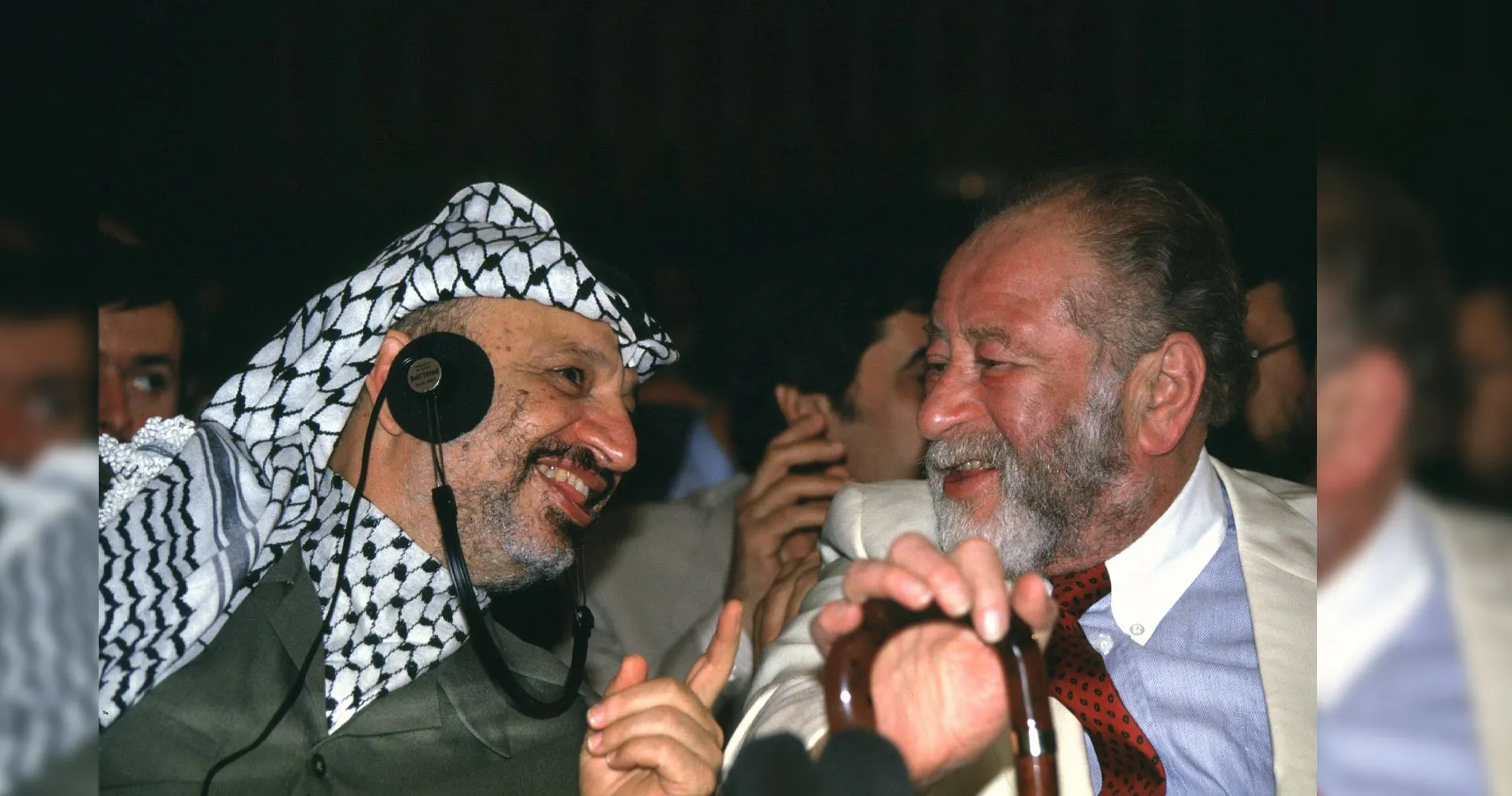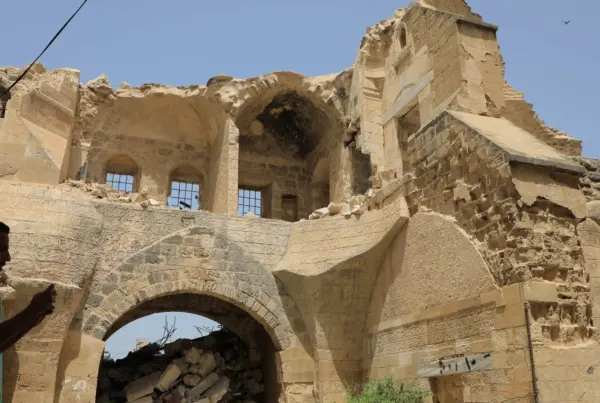Austrian Chancellor Bruno Kreisky (1911-1990) has made his mark on history. He was a builder of bridges and strongly believed in diplomacy. Kreisky was a staunch defender of Austria’s neutrality, which many observers today see threatened. He was instrumental in establishing Vienna as the third world headquarters of the United Nations in 1979. Although Kreisky was Jewish, he did not support Zionism. He contributed to the initiation of a dialogue for peace in the Middle East and met Yasser Arafat, the leader of the Palestine Liberation Organization (PLO), in 1979 – a move highly criticized by Israel and the US.
Daniella Vanova
11 April 2024
Arabic version | Chinese version | German version
Bruno Kreisky (1911-1990) was an important figure in post-WWII Austrian politics, serving as the Chancellor of Austria from 1970 to 1983. He made several notable contribution’s during his time in office which had a lasting impact on Austria to this day. Kreisky’s government implemented a series of social reforms that aimed to improve the lives of ordinary Austrians. These included improvements in healthcare, education and social welfare programs. His administration expanded social security benefits, increased access to healthcare, and worked to reduce poverty rates. Kreisky had a lasting impact on foreign policy, women’s rights, cultural policies, housing and infrastructure, green politics, and European integration.
When one walks through Vienna, it is difficult not to notice the beautiful buildings, monuments, statues and even its transportation system. His government provided funding for cultural institutions, festivals and artists, helping to preserve Austria’s rich cultural heritage, admired by locals and tourists alike.
Kreisky’s administration heavily invested in housing and infrastructure projects. This included the construction of affordable housing units to address housing shortages and improve living conditions for many Austrians. The government also undertook infrastructure developments, such as improving transportation networks and modernizing public facilities.
In terms of politics, Kreisky’s focus was two-fold: Austria’s foreign policy, and its European integration. Austria’s foreign policy under Kreisky emphasized its neutrality and its role as a bridge between East and West during the Cold War. He sought to improve relations with the Soviet Union and Eastern European countries while maintaining strong ties with the West. Kreisky was a strong supporter of European integration. During his time in office, Austria made strides towards closer cooperation with the European Economic Community (EEC), the precursor to the European Union. This created a strong foundation and paved the way for Austria’s eventual membership in the EU in 1995.
Kreisky particularly contributed to the initiation of dialogue with the Middle East, notably in the realm of diplomacy and peace efforts during the 1970s and 1980s. In 1973, during a conference in London, Chancellor Kreisky called on Europe to play an active role in the Middle East and declared his support for the creation of a state for the Palestinians. One of the most significant events was Kreisky’s meeting with Yasser Arafat, the leader of the Palestine Liberation Organization (PLO), in 1979. This meeting was highly criticized by some Western countries, particularly the United States and by Israel, as they considered the PLO a terrorist organization at the time.
Following this meeting with Arafat, Kreisky organized in 1981 the Vienna International Conference on the Middle East, which aimed to bring together representatives from Israel, Arab countries and the Palestinians to discuss peace and regional stability. While this conference did not lead to any immediate breakthroughs, it signaled Austria’s commitment to peace efforts within the region.
Kreisky’s government was among the first in Western Europe to recognize the Palestinian Liberation Organization (PLO) as the legitimate representative of the Palestinian people in 1980. This move was considered progressive and helped to legitimize the Palestinian cause on the international stage. Furthermore, it heavily contributed and enhanced Austria’s standing on the world stage. Following Kreisky’s example, Austria supported Palestine’s application to join UNESCO in 2011 and its bid to obtain non-member observer status at the United Nations
With all that Kreisky did for Austria, there is one aspect that stands out – his complex relationship with Zionism and the Israeli state. Although Kreisky was Jewish, he was known for questioning the traditional notions of Jewish identity and the concept of Zionism as the solution to the issues faced by Jewish people. Kreisky’s perspective on Jewish identity was rooted in his belief that Jews were primarily a religious group rather than an ethnic or racial one. This view influenced his approach to understanding the Jewish diaspora and the establishment of the State of Israel.
Another aspect of this complex relationship was his open critique of Zionism. He was particularly critical of its political and nationalist expressions. While he recognized the historical and cultural significance of the Zionist movement, he also believed that the solution to the issues faced by Jewish people should not solely rely on the establishment of a Jewish state.
Following in Kreisky’s footsteps, many Jews today, both in Israel and around the world, have criticized the policies of Israeli Prime Minister Benjamin Netanyahu, especially concerning Gaza. Netanyahu’s policies against Gaza, including military actions, blockades and indiscriminate killing of civilians, has faced harsh international and domestic criticism. Israel is officially charged as committing genocide in Gaza at the ICJ.
In later years, after Israel itself recognized the PLO in the 1993 Oslo accords, Kreisky was credited as a leader before his time, one who could predict political developments. Bruno Kreisky’s approach to establishing relations with the PLO and cultivating positive ties with various Arab leaders was characterized by pragmatism, diplomacy, and a commitment to conflict resolution. Kreisky recognized the need for Austria to play a constructive role in international affairs, and he sought to engage with the Middle East diplomatically during his tenure as Chancellor.
Kreisky’s commitment to dialogue extended beyond the PLO, as he actively engaged with various Arab leaders. His emphasis on diplomacy and understanding helped Austria build constructive relationships with Arab countries, fostering an environment conducive to dialogue and cooperation. Kreisky’s approach was based on the belief that open communication and negotiation were essential for addressing the complex geopolitical challenges in the Middle East.
Although Kreisky was heavily criticized by Zionists in Israel since his legacy completely diverges from the traditional Zionist narrative, current Israeli Prime Minister Benjamin Netanyahu has faced criticism for his perceived destructive impact on Israel, especially because of his handling of the Israeli-Palestine conflict, corruption allegations and the polarization within the Israeli state.
Kreisky’s legacy in Austria is marked by his progressive policies, commitment to social justice, and diplomatic achievements. He remains a revered figured in Austrian politics, remembered for his efforts to modernize the country and improve the lives of its citizens. His vision and contributions continue to shape Austria’s political landscape and social fabric to this day.







